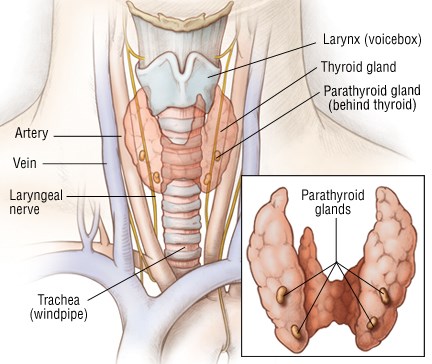The Parathyroid Glands
The human body is complex and multi-faceted. Interworking parts spread throughout the body must all function in tandem for optimal health, growth and development. The glands in the body, small organs responsible for the production of hormones, are some of the most important structures within the human body.
Of the glands in the human body, the parathyroid glands, are often misunderstood or mislabelled. Because their name sounds similar to the thyroid, many people mistakenly believe that the thyroid and parathyroid glands are one in the same. In fact, the parathyroid has a completely different function to the thyroid.
What Do the Parathyroid Glands Do?
The parathyroids only shares its name with the thyroid because of its close proximity to the thyroid gland. In some people, the parathyroid glands are actually housed within the thyroid, but more commonly the parathyroids are located on either side of the neck or even in the upper chest. The parathyroids are responsible for producing hormones that regulate the amount of calcium within the blood and in the bones. Because calcium is important for strong and healthy bones, the parathyroid gland is highly significant. The parathyroids also play a part in the regulation and processing of Vitamin D, an essential vitamin that is absorbed through diet and by exposure to sunlight.
What are the Common Symptoms Associated with Low Parathyroid Function
If the parathyroid gland fails due to injury, heredity, or adverse reaction to medication or radiation treatments, several serious symptoms may occur. The most apparent symptom of low parathyroid function is dramatic changes in mood. Individuals with poor parathyroid gland function may be irritable, depressed, easily angered or unpredictable. People may also experience muscle cramps and aches, difficulty breathing, hyperventilation, loss of feeling in the extremities or even serious seizures in some cases. This is why it is so important to monitor the function of this gland.
Overactive Parathyroid Symptoms
Hyperparathyroidism results from overactivity of the parathyroid glands. This leads to excess production of parathyroid hormone. Excessive parathyroid hormone secretion may be due to problems in the glands themselves, in which case it is referred to as primary hyperparathyroidism and which leads to raised calcium levels. It may also occur in response to low calcium levels, as encountered in various situations such as vitamin D deficiency or chronic kidney disease; this is referred to as secondary hyperparathyroidism. In all cases, the raised parathyroid hormone levels are harmful to bone and treatment is needed.
Consulting a Specialist
If you believe that you are experiencing any parathyroid gland related symptoms, and especially if you have a family history parathyroid gland problems, it is important to consult a doctor. Parathyroid gland problems are straightforward to treat and treatment options are often very effective. Leaving a parathyroid problem untreated can cause serious health disorders. A physician can test calcium and parathyroid hormone levels within your blood and determine whether or not the parathyroid glands are creating appropriate levels of these hormones. Early diagnosis is the best way to prevent serious health issues from developing.
If you have questions or concerns about parathyroid problems see your local doctor who will arrange for you to see a thyroid surgeon.

